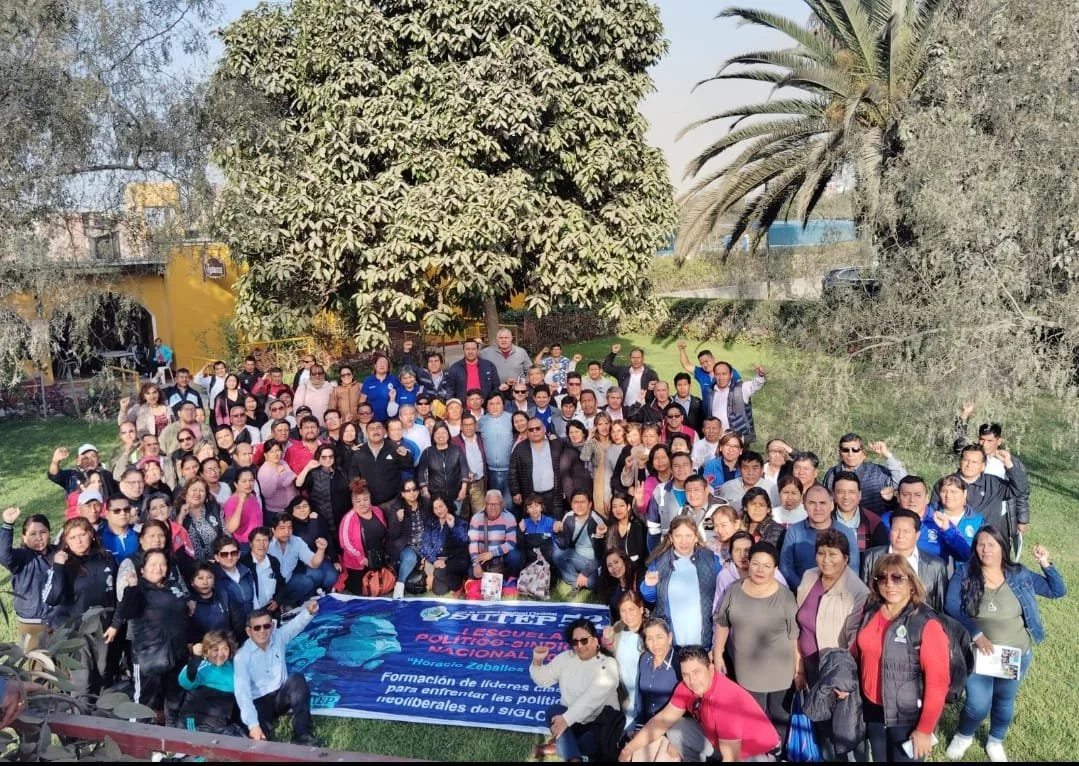The Peruvian Education Workers' Union (SUTEP) united in a national hunger strike on August 22, 2024. Teachers demand the government comply with legislation, increase funding for education, provide better and fair compensation for education workers, ensure decent pensions for retirees and those who have left the profession, and fulfill collective bargaining agreements.
The decision was made during SUTEP's III National Assembly of Delegates, held at the beginning of August, to urge the government to respect the collective agreement to include the demands of public education in the presentation of the General Budget to Congress, scheduled to be discussed on August 30. You can click here to read the details of the Collective Agreement.
According to SUTEP, if the Minister of Economy and Finances fails to comply with the collective agreement demanding immediate improvements in public education, teachers will be forced to go on an indefinite national strike.
CoDev and SUTEP, a 40-year partnership in solidarity
SUTEP has been a partner in CoDevelopment Canada's Education program since 1985. Since then, CoDevelopment Canada has facilitated a lasting solidarity alliance between SUTEP and the British Columbia Teachers' Federation (BCTF), one of Canada's largest teaching unions.
CoDevelopment Canada stands in solidarity with SUTEP and calls on the Government of Peru to urgently address SUTEP's demands to benefit all Peruvians. Click here to read the letter addressed to Dina Ercilia Boluarte Zegarra, President of the Republic of Peru.
We stand in solidarity with SUTEP as the union continues to advocate for public, free, and quality education, Intercultural Bilingual Education for Indigenous peoples, and their fight to improve the educational system and the rights of education workers.
Understanding the Political Context in Peru
2023 was a very active year for SUTEP with political and organizing activities, while Peru continued to be embroiled in intense political instability, social turmoil, and worsening conflict. In 2022, Dina Boluarte Zegarra assumed the presidency following the ouster of former President Castillo amidst weeks of social upheaval, a state crackdown and police repression that left more than 50 dead and over 800 injured countrywide. To date, the political crisis in the country is far from a solution. The State and its institutions have generated total distrust among communities and civil society organizations. They have intervened in electoral bodies, disqualified political opponents, criminalized social protest, controlled the judicial system, and blocked the proposal for early elections in Congress. A recent survey showed the ongoing widespread discontent in the population: President Boluarte has approximately 88% disapproval from citizens, 71% of the population does not believe anything she says, and 91% of Peruvians disapprove of the Legislative Branch.
Despite this, the government of Dina Boluarte has continued its authoritarian trajectory by imposing unpopular and harmful policies and interfering with the normal functioning of several institutions essential for guaranteeing justice and protecting human rights. Some parliamentarians in Peru have argued that President Boluarte has undermined the principle of independence, separation, and autonomy of government powers by obstructing judicial investigations, like the one against her brother and her lawyer, both accused by the Attorney General's Office of leading a corruption and influence peddling scheme. More recently, Boluarte's administration was accused of violating the law. First, the Attorney General's Office has begun a criminal investigation against President Dina Boluarte for the alleged crimes and violations of human rights and the death of protesters from poor, Indigenous and peasant backgrounds during the outbreak of late 2022 and early 2023. Second, Peru's Congress has recently approved a law that prevents the prosecution of crimes against humanity committed before 2002, which will benefit former President Alberto Fujimori and hundreds of military personnel investigated or prosecuted for participating in massacres and murders during the country's internal armed conflict between 1980 and 2000. More than 1,100 protests have taken place in the past 17 months as the Peruvian population continues to overwhelmingly demand the same as in 2022, including the convening of a constituent assembly, presidential elections, the resignation of Dina Boluarte, and justice for the deaths during the protests, as well as against police repression. SUTEP continues to be the strongest and most influential force in championing public education and labour rights and conditions for teachers and education assistants in Peru.
Accordingly, SUTEP is preparing to carry out a National Strike in August 2024 to demand that the government adequately address the educational system's needs and comply with the commitments already agreed upon in negotiations with SUTEP.
REFERENCES:
https://www.ohchr.org/sites/default/files/documents/countries/peru/Peru-Report-2023-10-18-EN.pdf
https://www.youtube.com/watch?v=VlNnrmDkx7g
https://www.amnesty.org/en/location/americas/south-america/peru/report-peru/
https://www.bbc.com/news/articles/c0w0kvvk6k1o
https://apnews.com/article/peru-congress-crimes-against-humanity-130cd287d1e1132b4c9ed605ec75f7c

